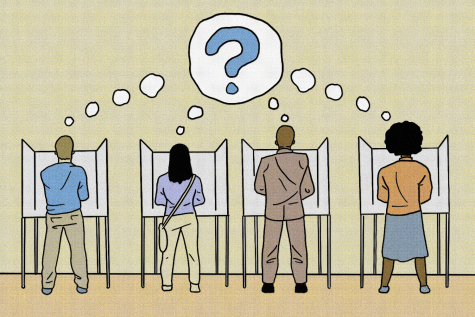Voting for judges: More than a two-person race
October 29, 2020

Along with voting for the next president and deciding whether Illinois should establish a graduated rate income tax, voters in Chicago will have to decide which judges to elect for Cook County Circuit Court, as well as Illinois’ Supreme and Appellate courts.
Kristy Gonowan, president of the Asian American Bar Association of the Greater Chicago Area, said it is important for judges to be fair and unbiased.
Gonowan said the significance of judicial leadership reaches from local and state courts all the way to the Supreme Court where Amy Coney Barrett was recently confirmed by the Senate.
“Just think about that in terms of Chicago,” Gonowan said. “These are judges that will be on the bench for at least a few years until they need to be retained again.”
Chicagoans will be voting for a handful of judicial candidates either running for the first time to fill a vacancy or running for a retention vote to keep their current position, which would require 60% of the vote.
There are 101 different judicial candidates across Chicago and Illinois that will fill a majority of each voter’s ballot and may cause some to hesitate in making a decision. However, there are organizations, like the Asian American Bar Association of the Greater Chicago Area, that review and evaluate candidates to help citizens make an educated choice.
Sarah King, director for the Women’s Bar Association of Illinois, said the amount of research anyone would have to do on their own “would be a pretty big task.” King said she has been approached by many of her friends and family asking her to explain the judicial candidates’ stances.
King said bar associations provide detailed evaluations of each judicial candidate in conjunction with the Alliance of Bar Associations, which consists of 12 different Illinois bar associations in collaboration.
These include: the Arab American Bar Association of Illinois, the Asian American Bar Association of the Greater Chicago Area, the Black Women Lawyer’s Association of Greater Chicago, the Chicago Council of Lawyers, the Cook County Bar Association, the Decalogue Society of Lawyers, the Hellenic Bar Association of Illinois, the Hispanic Lawyers Association of Illinois, the Illinois State Bar Association, the Lesbian and Gay Bar Association of Chicago, the Puerto Rican Bar Association of Illinois and the Women’s Bar Association of Illinois.
In order to put together detailed evaluations, King said the judicial evaluation committee has candidates undergo a review which includes interviews and background checks with colleagues or other law professionals who have worked with the candidate before.
King said candidates are evaluated for their litigation experience, legal knowledge and ability, integrity, sensitivities, diversity, bias, judicial temperament, diligence, punctuality, impartiality, character and professionalism.
Most bar associations that represent minority groups, such as the Lesbian and Gay Bar Association of Chicago and the Women’s Bar Association of Illinois, pay attention to what each candidate or judge has done to help individuals from BIPOC and LGBTQ+ communities.
Adam Zebelian, vice president of the board for the Lesbian and Gay Bar Association of Chicago, said it is important for voters to know the people they are putting in positions of power.
“We want to ensure that there are judges that are not only qualified and have the legal acumens to rule properly, but also are open-minded and will follow the law in a way that is respectful of every community member of Chicago,” Zebelian said.
In addition to the Alliance of Bar Associations, the Chicago Bar Association also evaluates judicial candidates across the city by asking similar questions and accepting applications from candidates for an evaluation. The CBA focuses on the Chicagoland area and is not affiliated with any specific bar associations.
Risa Lanier, chair of the Chicago Bar Association’s judicial evaluation committee, said deciding on who to put on the bench can drastically change how people are treated in traffic court for a ticket or if a parent receives custody in domestic relations court.
“I cannot overstate this enough,” Lanier said. “It is extremely important to know about the qualifications of judicial candidates because they make everyday decisions that impact our lives.”
For judicial candidate evaluations, visit the Alliance of Bar Associations or the Chicago Bar Association websites.







